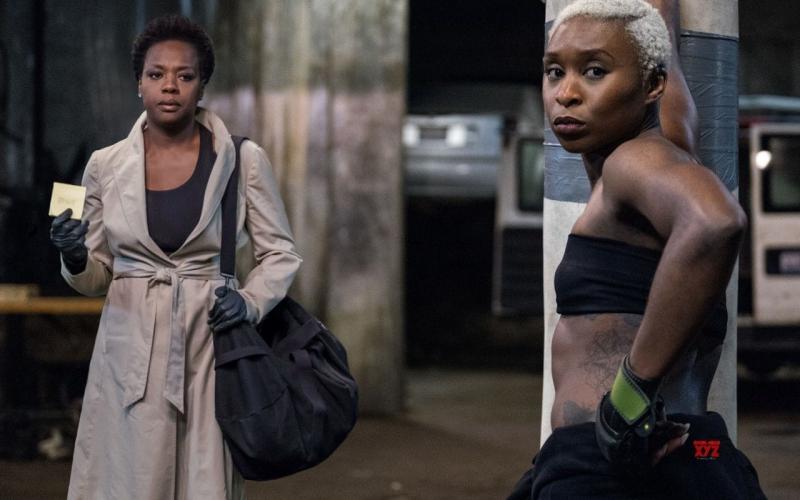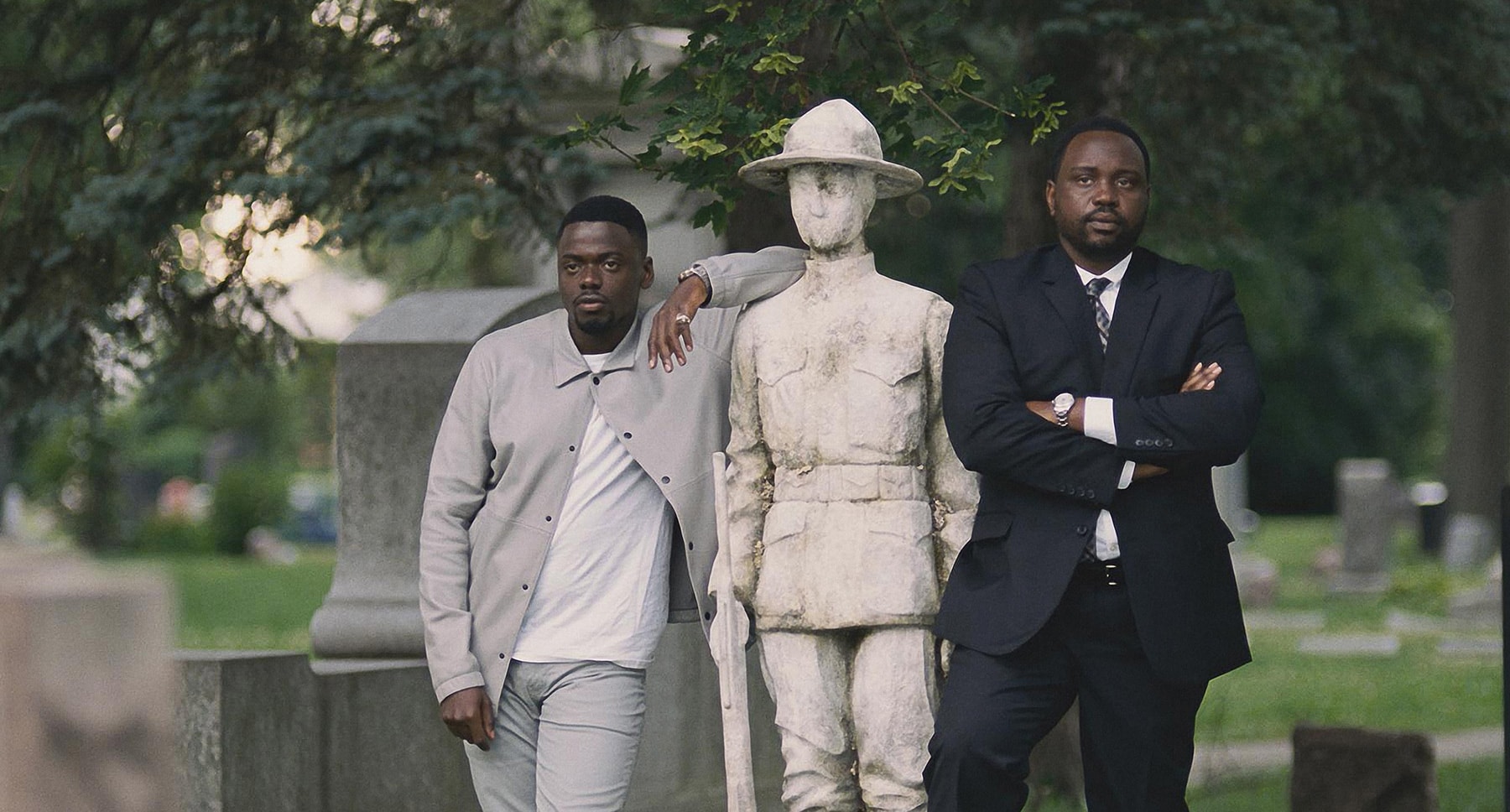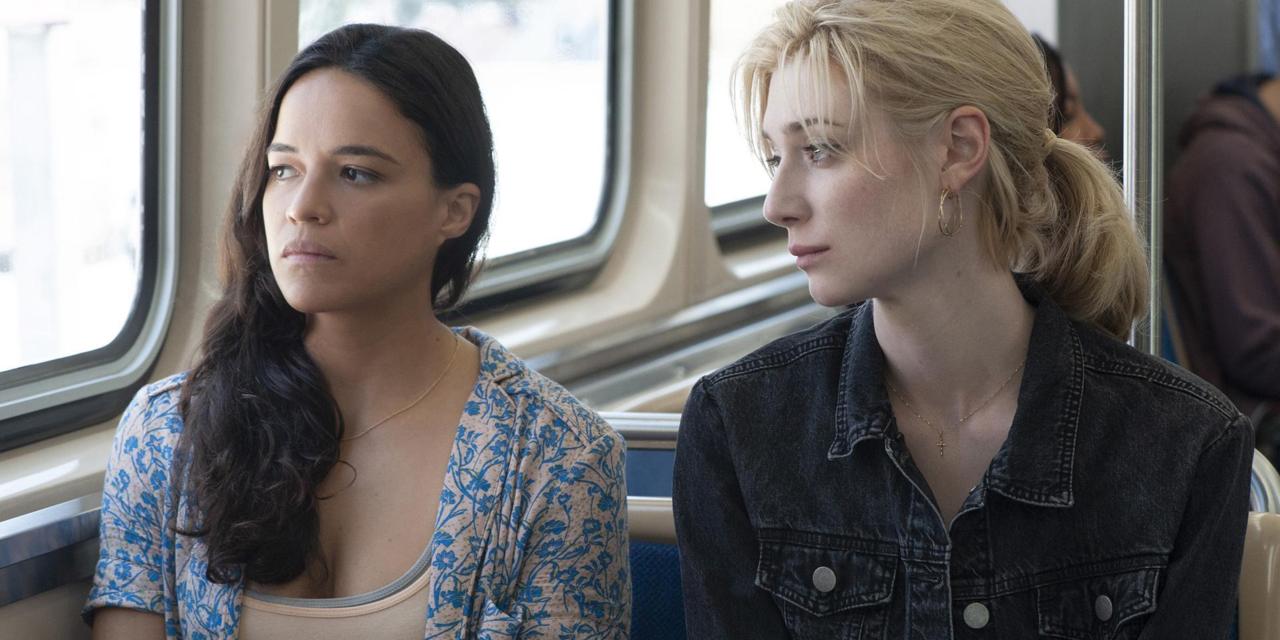Widows review - feminist crime pays | reviews, news & interviews
Widows review - feminist crime pays
Widows review - feminist crime pays
Steve McQueen coolly recalibrates the heist film

Steve McQueen’s progress from video artist to Oscar-winning director has been deceptively smooth.
Lynda La Plante’s fondly remembered ITV series Widows, adapted by McQueen with Gone Girl’s Gillian Flynn, gives him a sharply feminist template. This is again about crooks’ widows taking on their men’s business. McQueen’s opening scene splices domestic routines with the final, catastrophic job of legendary robber Harry Rawlins (Liam Neeson). A door spins off a van careening away from another gang’s gunfire, and straight into a police platoon. Rawlins, his confederates and $2 million haul become a fireball.
But the very first thing we see is Harry and his wife Veronica (Viola Davis) in bed, tongues exploring mouths with old intimacy. There’s a hint of Nic Roeg’s intercutting of Donald Sutherland and Julie Christie’s love-making under the shadow of their daughter’s death in Don’t Look Now. Harry and Veronica, we’ll learn, lost their teenage boy, shot to pieces one sunny day by racist cops. The rare visual jolt of black and white skin entwined is of a piece with this later shock. Chicago, where dozens are shamefully shot in the black South Side every weekend, is McQueen’s setting. Here, gang kingpin Jamal Manning (Brian Tyree Henry) is trying to go legit in a forthcoming election, though his enforcer brother Jatemme (Daniel Kaluuya, pictured above, left with Henry) remains hair-trigger violent. Jamal is fighting the inherited political power of Jack Mulligan (Colin Farrell), scion of old Irish bruiser Tom (Robert Duvall). The millions lost in Rawlins’ heist are linked to both camps. A frightening visit from Jamal convinces Veronica that her survival requires fighting back, by completing Harry’s last job.
Chicago, where dozens are shamefully shot in the black South Side every weekend, is McQueen’s setting. Here, gang kingpin Jamal Manning (Brian Tyree Henry) is trying to go legit in a forthcoming election, though his enforcer brother Jatemme (Daniel Kaluuya, pictured above, left with Henry) remains hair-trigger violent. Jamal is fighting the inherited political power of Jack Mulligan (Colin Farrell), scion of old Irish bruiser Tom (Robert Duvall). The millions lost in Rawlins’ heist are linked to both camps. A frightening visit from Jamal convinces Veronica that her survival requires fighting back, by completing Harry’s last job.
Davis gives Veronica mournful, numbly dogged strength. Her makeshift female crew also tap buried reserves, not least Alice (Elizabeth Debicki, pictured below, right with Michelle Rodriguez). Violently abused and belittled by both husband and mother (a cameo of cold female viciousness by Jacki Weaver), this 6’2” blonde lankily towers over her tormentors, and finally throws off her chains. A quick shot of her swaggering down the street after a scam, messily chomping at a hero sandwich, is the film’s most funnily feminist sight.
The widows’ criminal mission is sufficiently gripping, though the heist itself is underwhelming. In truth, Widows’ thriller mechanics are lukewarm. This matches the cool, sleek cinematography, which feels dispassionately observational, like Michael Mann minus the hot violence. McQueen (with Flynn) instead excels at socially rooted characters and arresting scenes. Farrell, currently excelling as fractured powerful men, is a reluctant leader, suffering masculine belittlement by the still relishably macho Duvall. Action heroine Michelle Rodriguez is cast as one of the female gang’s less effective members. Kaluuya similarly up-ends his Get Out role as a Cagney-charismatic, immature killer. His pig-sticking of Bobby Welsh (Kevin J O’Connor in a fine low-life turn), having first tipped him out of his wheelchair, is in a line with the prison guard’s murder in Hunger, and 12 Years a Slave’s tortures. McQueen’s explicit violence is meant to hurt. Here, it also hints at Tarantino and Paul Thomas Anderson’s black humour.
McQueen (with Flynn) instead excels at socially rooted characters and arresting scenes. Farrell, currently excelling as fractured powerful men, is a reluctant leader, suffering masculine belittlement by the still relishably macho Duvall. Action heroine Michelle Rodriguez is cast as one of the female gang’s less effective members. Kaluuya similarly up-ends his Get Out role as a Cagney-charismatic, immature killer. His pig-sticking of Bobby Welsh (Kevin J O’Connor in a fine low-life turn), having first tipped him out of his wheelchair, is in a line with the prison guard’s murder in Hunger, and 12 Years a Slave’s tortures. McQueen’s explicit violence is meant to hurt. Here, it also hints at Tarantino and Paul Thomas Anderson’s black humour.
Misogyny, racism and politics built on “dollar signs and empty promises” are Widows’ facts of life. So McQueen might as well have some criminal fun.
The future of Arts Journalism
You can stop theartsdesk.com closing!
We urgently need financing to survive. Our fundraising drive has thus far raised £49,000 but we need to reach £100,000 or we will be forced to close. Please contribute here: https://gofund.me/c3f6033d
And if you can forward this information to anyone who might assist, we’d be grateful.

Subscribe to theartsdesk.com
Thank you for continuing to read our work on theartsdesk.com. For unlimited access to every article in its entirety, including our archive of more than 15,000 pieces, we're asking for £5 per month or £40 per year. We feel it's a very good deal, and hope you do too.
To take a subscription now simply click here.
And if you're looking for that extra gift for a friend or family member, why not treat them to a theartsdesk.com gift subscription?
more Film
 London Film Festival - from paranoia in Brazil and Iran, to light relief in New York and Tuscany
'Jay Kelly' disappoints, 'It Was Just an Accident' doesn't
London Film Festival - from paranoia in Brazil and Iran, to light relief in New York and Tuscany
'Jay Kelly' disappoints, 'It Was Just an Accident' doesn't
 Iron Ladies review - working-class heroines of the Miners' Strike
Documentary salutes the staunch women who fought Thatcher's pit closures
Iron Ladies review - working-class heroines of the Miners' Strike
Documentary salutes the staunch women who fought Thatcher's pit closures
 Blu-ray: The Man in the White Suit
Ealing Studios' prescient black comedy, as sharp as ever
Blu-ray: The Man in the White Suit
Ealing Studios' prescient black comedy, as sharp as ever
 The Woman in Cabin 10 review - Scandi noir meets Agatha Christie on a superyacht
Reason goes overboard on a seagoing mystery thriller
The Woman in Cabin 10 review - Scandi noir meets Agatha Christie on a superyacht
Reason goes overboard on a seagoing mystery thriller
 London Film Festival 2025 - crime, punishment, pop stars and shrinks
Daniel Craig investigates, Jodie Foster speaks French and Colin Farrell has a gambling habit
London Film Festival 2025 - crime, punishment, pop stars and shrinks
Daniel Craig investigates, Jodie Foster speaks French and Colin Farrell has a gambling habit
 I Swear review - taking stock of Tourette's
A sharp and moving tale of cuss-words and tics
I Swear review - taking stock of Tourette's
A sharp and moving tale of cuss-words and tics
 A House of Dynamite review - the final countdown
Kathryn Bigelow's cautionary tale sets the nuclear clock ticking again
A House of Dynamite review - the final countdown
Kathryn Bigelow's cautionary tale sets the nuclear clock ticking again
 theartsdesk Q&A: Idris Elba on playing a US President faced with a missile crisis in 'A House of Dynamite'
The star talks about Presidential decision-making when millions of lives are imperilled
theartsdesk Q&A: Idris Elba on playing a US President faced with a missile crisis in 'A House of Dynamite'
The star talks about Presidential decision-making when millions of lives are imperilled
 Urchin review - superb homeless drama
Frank Dillane gives a star-making turn in Harris Dickinson’s impressive directorial debut
Urchin review - superb homeless drama
Frank Dillane gives a star-making turn in Harris Dickinson’s impressive directorial debut
 Mr Blake at Your Service review - John Malkovich in unlikely role as an English butler
Weird comedy directed by novelist Gilles Legardinier
Mr Blake at Your Service review - John Malkovich in unlikely role as an English butler
Weird comedy directed by novelist Gilles Legardinier
 Don't Let's Go to the Dogs Tonight review - vivid adaptation of a memoir about a Rhodesian childhood
Embeth Davidtz delivers an impressive directing debut and an exceptional child star
Don't Let's Go to the Dogs Tonight review - vivid adaptation of a memoir about a Rhodesian childhood
Embeth Davidtz delivers an impressive directing debut and an exceptional child star

Add comment